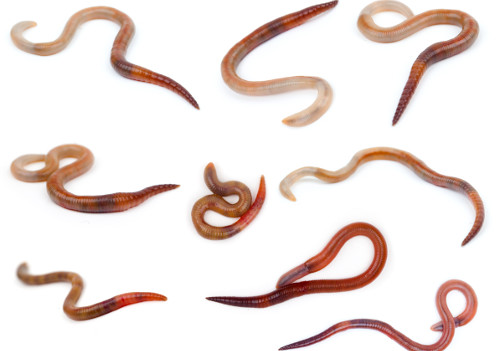Red Wiggler Worms - Necessary for Healthy And Balanced and Productive Gardens
Red Wiggler Worms - Necessary for Healthy And Balanced and Productive Gardens
Blog Article
Red Wiggler Worms Demystified: Opening the Secrets of Vermiculture for Greener Living and Nutrient-Rich Dirt
In the world of lasting techniques for improving dirt high quality and promoting eco-conscious living, red wiggler worms play a critical yet commonly ignored role. These simple creatures have the impressive capacity to change natural waste into nutrient-rich castings that work as a potent natural fertilizer. By delving right into the world of vermiculture, one can reveal a plethora of benefits that prolong much past traditional composting approaches. Understanding the complexities of looking after these worms, optimizing their atmosphere, and harnessing their castings can result in a greener way of living and much healthier soil for plants to thrive.
The Function of Red Wiggler Worms
Red Wiggler worms play a vital duty in composting systems by effectively damaging down natural matter into nutrient-rich spreadings. These voracious eaters take in a variety of natural materials, such as kitchen scraps, yard waste, and paper products. As they feed, the worms' digestive procedures break down the organic issue into a fine, dark, and nutrient-dense product known as worm spreadings or vermicompost.
The spreadings created by Red Wiggler worms are very useful for soil health and wellness and plant growth. They are rich in necessary nutrients like nitrogen, potassium, and phosphorus, which are essential for sustaining healthy and balanced plant advancement. In addition, worm spreadings consist of beneficial microorganisms and enzymes that aid boost dirt structure, boost water retention, and improve nutrient uptake by plants.
Benefits of Vermicomposting

In addition, vermicompost, the nutrient-rich final product of vermicomposting, offers as an outstanding organic plant food and soil conditioner. It enhances dirt framework, enhances dirt aeration, and raises dirt dampness retention. These residential properties add to healthier plants with stronger root systems and much better resistance to diseases and bugs. Vermicompost also enhances the dirt with important nutrients like nitrogen, potassium, and phosphorus, promoting plant growth and total soil fertility.
In addition, vermicomposting assistances lasting horticulture methods by supplying a natural and chemical-free alternative to synthetic plant foods. Red Wiggler Worms. This eco-friendly strategy not just enriches the soil yet additionally helps in reducing reliance on harmful chemicals, promoting a greener and much more lasting method of gardening
Establishing a Worm Bin
When establishing a worm container for vermicomposting, read here appropriate configuration is critical to ensure the success of the composting procedure. The first action in establishing a worm container is selecting an ideal container. This can be a plastic container or wood box that offers adequate room for the worms to walk around and has correct drain openings to avoid waterlogging. Next, a bedding material such as shredded newspaper, cardboard, or coconut coir ought to be added to the container. This bedding gives a comfy environment for the worms and helps preserve dampness levels.
After including the bed linen, introduce the red wiggler worms to the bin. It is recommended to begin with a handful of worms and slowly increase as they multiply. The worms ought to after that be given with food scraps such as fruit and veggie peels, coffee grounds, and eggshells. It is vital to prevent adding meat, dairy, oily, or salty foods to avoid attracting parasites and producing unpleasant smells.
Routinely check the wetness degrees and temperature in the worm bin to guarantee ideal conditions for the worms. With appropriate setup and maintenance, the worm container will properly transform organic waste into nutrient-rich compost for your plants and yard.
Gathering Worm Castings
To successfully accumulate nutrient-rich worm castings from your vermicomposting system, a systematic harvesting technique is essential. When it comes time to collect the worm spreadings, there are a couple of crucial actions to follow to guarantee an effective procedure. Firstly, stop including fresh food scraps away of the worm container for a pair of weeks before harvesting. This urges the worms to move to the side with fresh bedding and food, making it simpler to scoop out the spreadings from the opposite.

Troubleshooting Common Issues
Identifying and addressing common challenges that might emerge during the vermicomposting process is critical for keeping a productive and healthy and balanced worm bin. Adding excess food scraps can lead to an accumulation of dampness and acidity in the worm bin, possibly damaging the worms. An additional concern is unpleasant smells originating from the worm bin.
In addition, if the worm population is decreasing or the worms show up undesirable, it might be due to environmental stress factors such as find out this here extreme temperatures or pH degrees. Keeping track of these elements and making required modifications is crucial for the well-being of the worms. By troubleshooting these common concerns immediately, vermicomposters can guarantee a effective additional resources and smooth vermicomposting process while preserving a prospering worm population.

Conclusion
In verdict, red wiggler worms play a crucial duty in vermiculture by breaking down natural matter into nutrient-rich soil. Establishing up a worm container is important for successful vermiculture, and harvesting worm spreadings gives useful compost for horticulture.
As they feed, the worms' digestive system processes break down the natural matter right into a fine, dark, and nutrient-dense product known as worm spreadings or vermicompost.
The castings created by Red Wiggler worms are very advantageous for dirt wellness and plant development. Adding excess food scraps can lead to an accumulation of wetness and acidity in the worm container, potentially harming the worms.In addition, if the worm populace is declining or the worms appear harmful, it could be due to ecological stressors such as extreme temperatures or pH levels. Establishing up a worm bin is important for effective vermiculture, and gathering worm spreadings supplies important compost for gardening.
Report this page